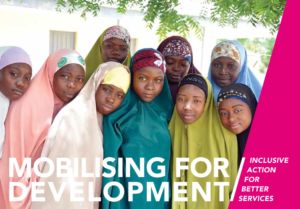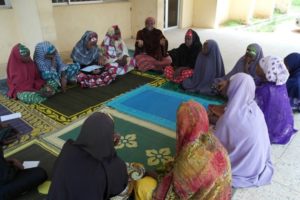Itad conducted an independent impact evaluation of the DFID-funded Mobilising for Development (M4D) programme, which aimed to enable adolescent girls to acquire life and livelihood skills and engage in governance processes across nine Local Government Areas (LGAs) in three Northern Nigeria States of Jigawa, Kaduna and Kano.
A Political Economy Analysis conducted at the outset revealed the context in which the programme would work:
- Adolescent girls are routinely excluded from, and do not have the platforms or capacity to engage in, governance processes.
- The prevalence of early marriage was driven by cultural belief, and social pressure on parents, that a girl must be a virgin at the time of marriage. Thus, a logical way of ensuring this happened was to ‘marry off’ girls early.
- However, there were also numerous young girls being asked by their parents to hawk goods at locations at considerable distances from home, in order to build the economic status of the household. This was occurring despite public knowledge that hawking exposed the girls to sexual coercion, harassment and assault.
‘Marrying off’ a girl early, therefore, would simultaneously reduce the pressures of poverty on the household and offer the possibility of escape from poverty for the girl by marrying a (usually older) man who has a livelihood, while also potentially preserving and even enhancing their social standing in the community1.
Engaging Adolescent Girls
With this in mind, M4D used an adapted Safe-Spaces/Girl Hub Approach – and called it Life Skills Clubs (LSCs) or Life Skills Forum – to provide mentoring support to a cohort of girls aged 13-17, for a period of nine to 12 months. The forum aimed to provide girls with a core set of life skills focused around self-discovery, including civic education, leadership, needs analysis and prioritization,

negotiation and conflict management, participatory skills, personal health and hygiene, violence against women and girls, and financial literacy plus a module on a livelihood skill area (with leveraged microgrants from the programme).
The programme also supported the emergence of Peer Champions from LSCs to form a fluid structure known as Girls’ Platform – elected to serve as the representatives for engagement at different levels: policy makers (PMs) or service providers, other adolescent girls (AGs), community-based organisations (CBOs), and the wider community.
Over the course of our evaluation, we were able to pull out some important lessons for engaging adolescent girls in governance processes.
Understanding and working with issues that resonate with cultural values is essential. In the course of implementation, M4D attempted an alternative approach to effecting progressive change, alert to the sensitivities and complexities of public positions on culture and gender in northern Nigeria. Instead of challenging culture, and being seen to be passing moral judgment on the prevailing culture of local communities (insinuating that they were perpetrating gender inequality), the programme sought to build on positive religious beliefs and cultural values to achieve progressive results. The M4D work with LSCs honed in on ‘Tarbiyah’ – a concept and practice of intrinsic importance in Islam, namely the growth and development of children, including their education and moral upbringing. This contributed to acceptance because community members expressed observing differences between girls in LSCs and girls who were not; saying things like girls no longer roam around irresponsibly; they have become very respectful and highly responsible; they now know how to communicate with others, take care of themselves, how to be self-dependant.
Economic drivers have an intrinsic role in girls’ interest in local governance. Over the course of M4D engagement, access to livelihoods was of great value to girls. The identification of the underlying factors of early marriage led the programme to focus on the heightened risks to girls from poor households, and the benefit of livelihoods skills to them. Once girls started to develop and use their livelihoods skills through LSC/LSFs, they began to contribute to the overall family income – and no longer be a drain on household resources but add to them. Furthermore, they no longer needed to work as street hawkers which reduced the risks of sexual coercion and assault to which they would otherwise be exposed. Strengthening the economic assets of adolescent girls proved to be a logical approach to strengthening networks between girls for their effective participation in local governance.

Community dialogues are effective for catalysing efforts that address gender challenges experienced by women and girls. Community dialogues are aimed at bringing to light endemic problems experienced by girls. Such platforms enable communities to talk about these challenges, agree on ways to address them, as well as how to implement agreements reached. As an example, at the start of the LSC work in 2014, only about 5% of girls were going to tertiary institutions across the M4D implementation communities. This figure rose to more than 40% by the end of the programme.
Changing the mindset of adolescent girls is important. The perception that it is against the will of all adolescent girls to be deprived of an education, and married off early can be wrong; it was not unusual to find adolescent girls in LSCs who aspired to get married early and own “kayan aure” which are marriage items, largely simple household furniture and utensils provided to a girl by her parents when she is about to be married off. Through topics treated within LSCs however, such girls began to aspire to become more.
Supporting girls to participate in local governance address gender challenges that they face. The focus on strengthening girls’ participation in local governance has resulted in girls engaging with communities on gender issues that are viewed as sensitive and communities in turn working with girls to address these issues, elicits a pathway to social transformation through social accountability. As an example, the second chance education initiative in Dawakin Tofa LGA of Kano State resulted in several adolescent girls (married and unmarried) returning to school, to further their education.
Traditional and religious mediation councils can serve as a mechanism for adolescent girls and women to secure their rights. M4D’s work with committees of sulhu (conflict resolution under Sharia Law) yielded positive results for preventing forced marriage. There were examples of sulhu committees halting forced marriage plans, as well as making parents send their children back to school. This also underscores a need for adolescent girl programmes, to shift focus from early marriage to forced marriage, as a potential strategy to keep girls in school for longer.
Providing incentives to families can improve school enrolment and retention, and potentially address child marriage. A conditional scheme which focuses on the subsidization of government services, and tied to production and not consumption, is attractive to family heads, especially males. Results from cluster farming in Jigawa (which is of priority to the heads of households), on the condition that girls can stay in school much longer, is proving to be a better and sustainable approach.
At the close of the programme in May 2018, M4D had directly reached 35,738 adolescent girls across the three states. There was evidence of increased confidence of the girls in engaging in wider development issues in their communities as well as direct engagement with PMs. Increased voice and acceptance of AGs in the communities, was evident, including by religious leaders – we saw joint generation of demands (ensuring that the views of AGs are reflected) and mainstream and PWD CBOs routinely involved AGs in their activities (through LSCs or GPs) as just a couple of examples of increased engagement.
There are signs of sustainability of LSCs through their scaleup within M4D LGAs and replication beyond focal LGAs. Between 2016 and the end of the programme, M4D stakeholders had facilitated the emergence of an additional 239 LSCs to the programme’s 411. The Ministries of Women Affairs and Social Development (MWASD) in the three focal States have institutionalised LSCs – through the inclusion of scaleup activities in their annual budgets, while Kaduna State has LSCs in their new gender policy.

